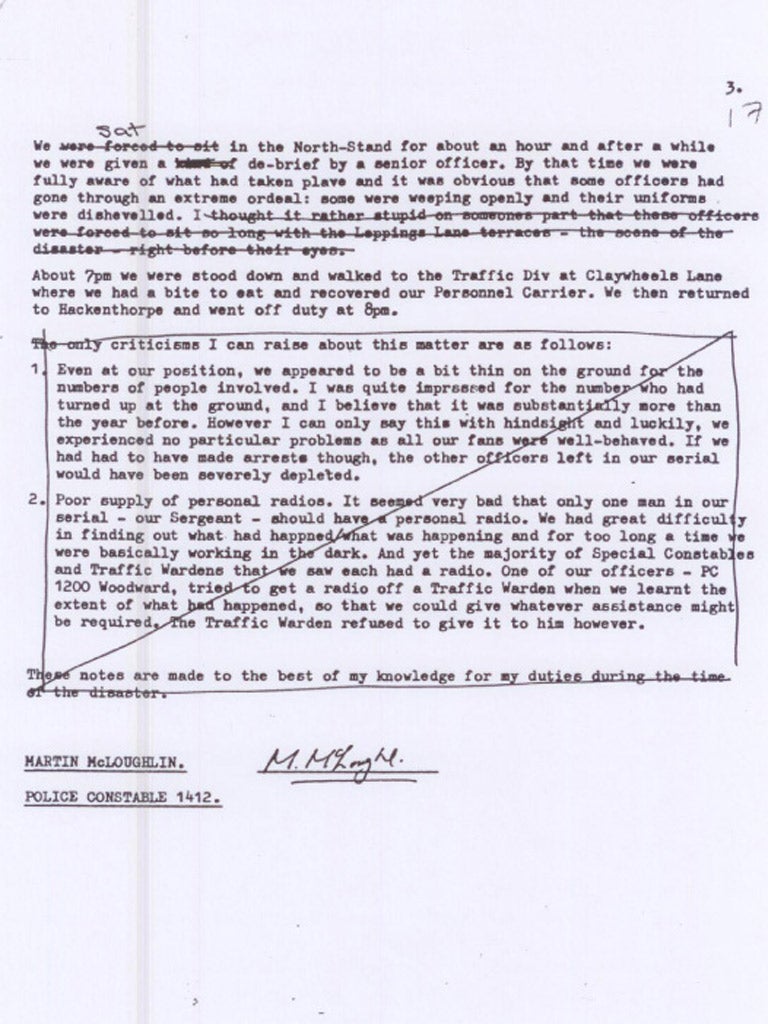Blame game: how police doctored 164 pieces of evidence

The Hillsborough Independent Panel has not ruled out the possibility of criminal prosecutions over the deliberate distortion of junior police officers’ evidence, approved by the chief constable of the South Yorkshire force, which saw 164 statements substantially altered and comments unfavourable to the constabulary removed or altered in 116.
Two of the four doctored statements revealed in yesterday’s Independent also feature in the Panel’s detailed examination of a “review and alteration” process undertaken by a senior South Yorkshire officer, Chief Superintendent Donald Denton, and Peter Metcalf, a lawyer from the force’s legal representatives Hammond Suddards, which left some junior officers deeply uncomfortable. Also complicit in the process was the then chief constable of the force, Peter Wright, who knew officers were concerned about the editing, the Panel’s research shows. The South Yorkshire Metropolitan Ambulance Service, whose own deep failings were an unexpected part of the 395-page panel report, altered 54 of the 101 statements produced by its own staff the new inquiry report found. “There’s sufficient new evidence that cries out for proper consideration for the proper authorities whose job it will be to decide [if there are grounds] for a prosecution,” said solicitor Raju Batt, one of the Panel’s nine members.
The Panel’s chapter of evidence on the doctored statements showed that officers were expressly told not to start recording their experiences in their pocket books – the standard way of providing an accurate record. The amendment of statements began when West Midlands Police and Lord Justice Taylor’s inquiry teams asked to see them. Another senior officer integral to the amendment process during the lead-in these inquiries was South Yorkshire assistant chief constable Stuart Anderson, who said that “editing” the statements for the purposes of the inquiry required the removal by solicitors of “conjecture and opinion” leaving only “matters of fact.” ACC Anderson ordered that there should be no “matters of impression” – though he did also insist that “no amended statement will be submitted to West Midlands Police until it has been seen and signed by the officer making it.”
Yesterday’s Panel report details exhaustively the way the statements were changed – with correspondence between the force and its lawyers stating that material “unhelpful to the force’s case” would be removed. The most significant amendments clearly altered the meaning of the original and in most of the 164 altered statements, the end result was to downplay or removed criticisms made by officers about “police leadership or the response to the disaster.” The doctored statement provided by PC Alan Wadsworth – featured in yesterday’s Independent – is one of those the Panel focuses on. As this newspaper has reported, PC Wadsworth’s declaration that “there was no leadership at the Leppings Lane End following the disaster, either in person or on the radio ” was removed. PC Martin McLoughlin’s description of the “note of real fear and panic” from a fellow officer also featured in the Panel report.
The Panel observed how references to ‘panic’ were frequently removed. In total, 23 officers had references to ‘chaos,’ ‘fear’, ‘panic’ and ‘confusion’ altered or deleted from their original recollections, while five had references to ‘chaos’ deleted. The Panel chronicles a short undated note later issued to officers with guidance on how to complete statements. It states that “no CRITICISMS” (the force’s capital letters) should be “levelled at anyone in the text of your summary.” Furthermore, there should be “no mention of the word CHAOTIC (force’s capitals) or any of its derivatives which would give rise to the assumption that complete control of the ground. These requests were the “express wish” of a Detective Inspector King.
Curiously, statements which criticized Liverpool fans were amended in 33 cases and though the Panel does not offer a rationale, it is the intemperate language, calling Liverpool fans “animals” and a “drunken rabble” which was crossed out. The Panel report concludes that Lord Justice Taylor and Lord Justice Stuart-Smith, who conducted a scrutiny of the Hillsborough evidence, were wrong to say that the doctoring of evidence did not affect the course of justice. The role of the South Yorkshire force’s solicitors was also deemed more significant and “directive” that Stuart-Smith had appreciated.
Join our commenting forum
Join thought-provoking conversations, follow other Independent readers and see their replies
Comments
Bookmark popover
Removed from bookmarks